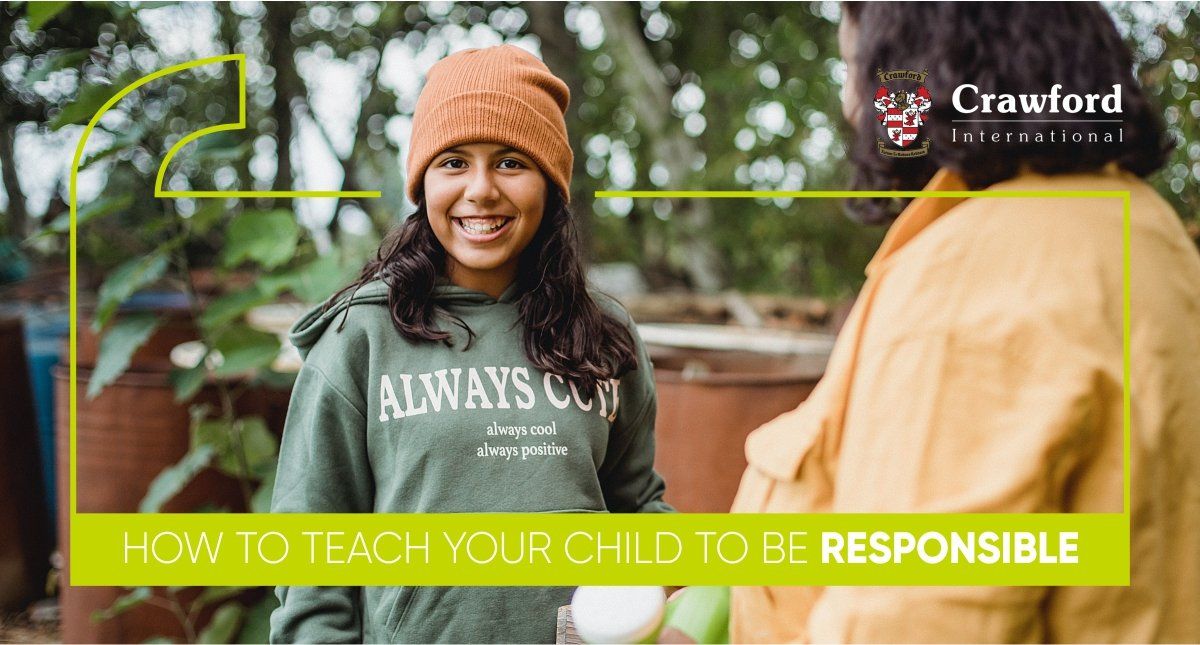How you can teach your child to be responsible
November 18, 2022
Top tips on how to raise a responsible child.

Responsibilities are a regular part of life – the have-tos that define our daily lives and help us achieve success in many areas, such as teamwork, socialising, our occupations, relationships, and more. Accountability and responsibility are all about owning how our actions affects others and looking out for the well-being of others, about being dependable and making good choices.
Yet, understanding responsibility and how to own it is not something we’re born with. It’s something we all had to learn, and teaching children responsibility is something we need to do from a young age.
How to teach responsibility from a young age
It may surprise you that children as young as infants can start to learn what responsibility is. It all boils down to boundaries, routines, and duties.
During their first year of life, babies learn and develop at a phenomenal pace. They go from functioning on pure instinct to picking up cues and learning from their worlds. So, you’ll notice that a baby learns quickly that there is a pace to the day – they know certain things happen at certain times and can help you in these moments. For example, lifting their arms when you’re dressing them or helping you pick up toys after play time. It’s also important to let your child try to do things for themselves before you rush in to help them. They may not get it completely right, but you’re laying the foundations of responsibility here.
Between two and three years old you can also start introducing basic daily routines and chores, such as brushing teeth, putting their clothes in the washing basket, following basic instructions to help you (such as throwing something away in the bin), and helping you with some household chores (giving a toddler a cloth and letting them ‘dust’ also gives you a bit of downtime!). This is also where responsibility to others comes into play, where they learn about the importance of sharing with others, taking turns, and being kind to their friends.
Teaching kids responsibility as they grow
As your child gets older, a child’s responsibilities grow to include their accountability and duties as a student – such as paying attention in class, working with, and helping others, completing their tasks – as well as their responsibilities as a friend and world citizen. It really is all about working together to make the world a better place.
Consider these factors as you teach your child responsibility through the years:
It starts with your child
Responsibility is a big thing to learn, and kids won’t always get it right. But they learn it best by being held accountable in age-appropriate ways. So, children from five years of age can be in charge of getting themselves ready for school every morning, making their breakfast, helping to feed and clean up after pets, making their beds, helping you make dinner by washing and peeling vegetables, etc. These are tasks that contribute not only to their well-being, but that of the family too. As they get older, they can take on more difficult tasks, even cooking a dinner for the family each week. This isn’t about making them take on the adult responsibilities of running a household, but to teach them that every member of the family has a role to play.
Keep it clear
When it comes to giving your child tasks, always be clear in your request and put it as simply as possible. If you make it too complicated, you won’t get their buy-in. So, explain that in a family every person has a part in helping to keep things going, and explain what their daily chores would be. When it comes to responsibilities in the outside world, do the same.
Think about real life
It’s often difficult for kids to see the long-term effects of their actions – part of teaching children responsibility is them learning how what feels like a sacrifice is often something that helps us achieve something together, which is something that comes to the fore in teamwork. So, when they’re helping you set the table or passing you ingredients for the dinner, they’re helping you make, you’re showing them in a real-life way how their actions help to make something as a group. And when they’re playing with others, be sure to correct them if they’re not sharing or taking turns.
Be positive
Enforcing any kind of rule is often met with resistance, but instead of challenging this with even more rules and consequences, try to focus on the positives. Firstly, give your child the space to figure their responsibilities out. If, for example, they’re struggling to get neatly dressed in the morning, resist the urge to help them tuck their shirt in. They can and will be able to get it right eventually. Then, shower your children with praise for the tasks and moments of responsibility they do get right. Reward their actions too – if they want to go play outside tell them, “Sure, once you’ve finished your homework you can play in the garden.” And if they don’t fulfil the tasks that are set out for them, you have to follow through with the consequences – they have to learn how to live with the choices they’ve made. So, if they forget to pack the reader in their school bag, don’t rush off to school to drop it off.
Read more informative Crawford International blog articles here.












